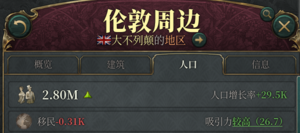{{#evt: | service= youtube | id= _U5FltMuWDo | description= Victoria 3: October 2021 Update. A summary of last month's dev diaries, including: Standard of Living, Political Movements, Slavery, states, and Migration. | alignment= right | container=frame }}
Migration is the movement of pops between states.
Migration types
There are two types of migration in Victoria 3:
- Intra-market migration is the movement of pops between two states that are part of the same market. Human rights laws define who can migrate within the market, be it everyone except slaves (No Migration Controls), non-discriminated pops (Migration Controls) or nobody (Closed Borders). The number of individuals that are able to change their homes on a weekly basis varies based on factors such as the local infrastructure and market access in the two states.
- Mass migration is a mechanic that models the migration of large amounts of people to places such as the US, Brazil and Australia in the 19th century. Mass migration can happen when a particular culture experiences turmoil, which is a product of having a large number of radicalized pops.
Migration attraction
Which pops migrate from and to what states depends on the migration attraction of each state.
Migration attraction is a value that is based on the average standard of living in the state, and modified by various factors such as over/underpopulation, unemployment/available jobs and so on. It is possible for a country to directly encourage migration to a specific state through the "Greener grass campaign" decree, at the cost of some ![]() authority. States with a low population compared to the amount of available land are especially attractive to economic immigrants.
authority. States with a low population compared to the amount of available land are especially attractive to economic immigrants.
In general, pops will move from states with a low standard of living and a lack of employment opportunities to states with a high standard of living and jobs to offer.
Discrimination
Discrimination also plays a role in migration. Pops that are being discriminated against in a particular state, and have the opportunity to migrate to another state in that market where they would not be discriminated against will take that opportunity in greater numbers, provided of course that there is an underlying economic reason for them to want to move there in the first place. This usually happens when multiple countries share the same market, and one of those countries having more liberal citizenship or religious laws.
Discrimination can also have the opposite effect: pops that are already enjoying full citizen rights are generally going to need to be in pretty dire economic straits to consider moving somewhere where those rights are going to be taken away. In the case of a pop that is going to be discriminated against no matter where they go in the market, they tend to stick to their cultural homelands.
Migration target
A culture that has enough turmoil to meet the threshold has a chance to create a ![]() migration target somewhere in the world, which is a flag set on a particular state that attracts huge numbers of migrants from that culture over the course of a limited timespan to that state and any states neighboring it. Migration targets are more likely to be created if the pops in the culture have a low standard of living and high literacy, and particularly likely to be created if there is widespread starvation among the pops of that culture.
migration target somewhere in the world, which is a flag set on a particular state that attracts huge numbers of migrants from that culture over the course of a limited timespan to that state and any states neighboring it. Migration targets are more likely to be created if the pops in the culture have a low standard of living and high literacy, and particularly likely to be created if there is widespread starvation among the pops of that culture.
The selection of states for migration targets is based on a number of factors, including the state's migration attraction, whether or not the culture is legally discriminated against in the country, and if there is a logical "path" that pops of the migrating culture would be able to follow from their homelands to the target (such as trade routes). There is no inherent advantage in certain country tags for who gets migrants -- the US tends to get migrations because of availability of jobs and land combined with liberal citizenship laws, not because they have a built-in migration attraction bonus.
Migration policy
Migration policy is a group of laws which sets the stance of the country on migration. For example, one can chose to promote the movement of people from their core lands to their colonies, attract skilled workers from other countries for their manufacturing economy, while another may prefer to just minimize all migration (external and internal) as a way of maintaining their iron grip over the population.
